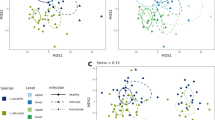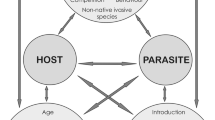Abstract
Threat-sensitive decision-making might be changed in response to a parasitic infection that impairs future reproduction. Infected animals should take more risk to gain energy to speed up their growth to achieve early reproduction and/or to strengthen their immune response. To avoid correlational evidence, we experimentally infected and sham-infected randomly selected immature three-spined sticklebacks with the cestode Schistocephalus solidus. For 7 weeks we determined the threat-sensitive foraging decisions and growth of individual sticklebacks in the presence of a live pike (Esox lucius). The experimenters were blind with respect to the infection status of the fish. In contrast to previous studies, our recently infected fish should have been almost unconstrained by the parasite and thus have been able to adopt an appropriate life history strategy. We found a strong predator effect for both infected and uninfected fish: the sticklebacks’ risk-sensitive foraging strategy resulted in significantly reduced growth under predation risk. Infected fish did not grow significantly faster under predation risk than uninfected fish. Since infected fish consumed much less prey in the presence of the predator than did infected fish in its absence, they obviously did not use the opportunity to maximize their growth rate to reach reproduction before the parasite impairs it.
Similar content being viewed by others
Author information
Authors and Affiliations
Additional information
Received: 21 June 1999 / Revised: 27 November 1999 / Accepted: 5 September 2000
Rights and permissions
About this article
Cite this article
Aeschlimann, P., Häberli, M. & Milinski, M. Threat-sensitive feeding strategy of immature sticklebacks (Gasterosteus aculeatus) in response to recent experimental infection with the cestode Schistocephalus solidus . Behav Ecol Sociobiol 49, 1–7 (2000). https://doi.org/10.1007/s002650000273
Issue Date:
DOI: https://doi.org/10.1007/s002650000273




